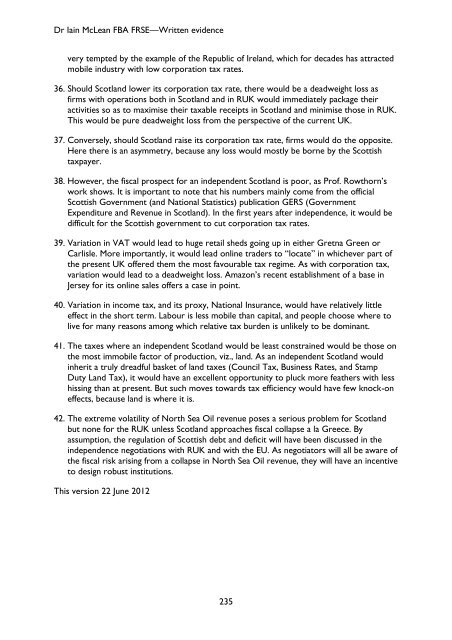SELECT COMMITTEE ON ECONOMIC AFFAIRS - Parliament
SELECT COMMITTEE ON ECONOMIC AFFAIRS - Parliament
SELECT COMMITTEE ON ECONOMIC AFFAIRS - Parliament
You also want an ePaper? Increase the reach of your titles
YUMPU automatically turns print PDFs into web optimized ePapers that Google loves.
Dr Iain McLean FBA FRSE—Written evidence<br />
very tempted by the example of the Republic of Ireland, which for decades has attracted<br />
mobile industry with low corporation tax rates.<br />
36. Should Scotland lower its corporation tax rate, there would be a deadweight loss as<br />
firms with operations both in Scotland and in RUK would immediately package their<br />
activities so as to maximise their taxable receipts in Scotland and minimise those in RUK.<br />
This would be pure deadweight loss from the perspective of the current UK.<br />
37. Conversely, should Scotland raise its corporation tax rate, firms would do the opposite.<br />
Here there is an asymmetry, because any loss would mostly be borne by the Scottish<br />
taxpayer.<br />
38. However, the fiscal prospect for an independent Scotland is poor, as Prof. Rowthorn’s<br />
work shows. It is important to note that his numbers mainly come from the official<br />
Scottish Government (and National Statistics) publication GERS (Government<br />
Expenditure and Revenue in Scotland). In the first years after independence, it would be<br />
difficult for the Scottish government to cut corporation tax rates.<br />
39. Variation in VAT would lead to huge retail sheds going up in either Gretna Green or<br />
Carlisle. More importantly, it would lead online traders to “locate” in whichever part of<br />
the present UK offered them the most favourable tax regime. As with corporation tax,<br />
variation would lead to a deadweight loss. Amazon’s recent establishment of a base in<br />
Jersey for its online sales offers a case in point.<br />
40. Variation in income tax, and its proxy, National Insurance, would have relatively little<br />
effect in the short term. Labour is less mobile than capital, and people choose where to<br />
live for many reasons among which relative tax burden is unlikely to be dominant.<br />
41. The taxes where an independent Scotland would be least constrained would be those on<br />
the most immobile factor of production, viz., land. As an independent Scotland would<br />
inherit a truly dreadful basket of land taxes (Council Tax, Business Rates, and Stamp<br />
Duty Land Tax), it would have an excellent opportunity to pluck more feathers with less<br />
hissing than at present. But such moves towards tax efficiency would have few knock-on<br />
effects, because land is where it is.<br />
42. The extreme volatility of North Sea Oil revenue poses a serious problem for Scotland<br />
but none for the RUK unless Scotland approaches fiscal collapse a la Greece. By<br />
assumption, the regulation of Scottish debt and deficit will have been discussed in the<br />
independence negotiations with RUK and with the EU. As negotiators will all be aware of<br />
the fiscal risk arising from a collapse in North Sea Oil revenue, they will have an incentive<br />
to design robust institutions.<br />
This version 22 June 2012<br />
235

















